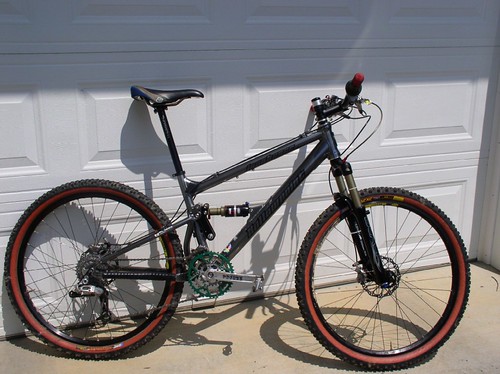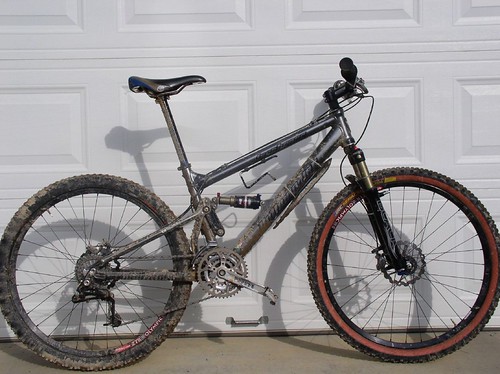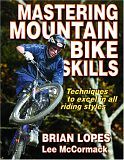Comparing Black 80 SPV to Black 100 Super Air on the Hollowpoint
I've been trying a different fork on my Hollowpoint Here's comparison. Though I regret that this isn't an apples to apples comparison as one fork is SPV and one is TPC.
Note that the trails I ride are XC but not buffed at all. Rocks roots but not huge drops or anything.
Background
I've had an Answer Manitou Black 80 SPV on my hardtail for a while. I liked it well enough, but hadn't really embraced the SPV and was on the fence as to whether it was better for XC. At the time I wasn't sure if the compromise in small bump compliance was a drawback. When I got my Hollowpoint I had a choice between a SPV fork or a TPC fork. I decided to try out a 100mm Black Super Air with TPC lockout
100mm Black Super Air

*note this picture shows it with a longer stem than I settled on
This is a super cush fork. The first thing I realized is that 100mm is a lot more than 80mm. Well it certainly feels like more than 20mm. A lot of racers love their remote lockouts and say that they use them as much as they shift. I found that I didn't care for the remote lockout much. The body of my grip shift got in the way of the lever so I had to move my hand slightly to engage it which meant that I didn't do it all the time. The remote lockout was slightly finicky so it didn't engage every time either.
What bothered me the most was that the fork was just too cushy when unlocked. There was no additional compression damping adjustment with the remote lockout. On bomber downhills it ruled. But everywhere else it was just too cush.
Answer sent me a TPC lockout damper to replace the remote lockout.
BTW in all my years of riding Answer has provided the best customer service hands down.
The TPC lockout damper goes on the right leg and provides some additional compression damping adjustability. The lockout was more reliable than the remote. I only used the lockout on long extended climbs.
For general riding this fork is great. Especially bombing downhills. But when trying to hoss it on short climbs and pedalling sections I felt that some energy was being lost.
Trying out a Black 80 SPV

The HP seems to be designed around a 100mm fork at the minimum. Trail riders go as high as 130mm+. I was most concerned about pedal strikes with a lower BB, but Iron Horse spec'ed a Race Lite version of the Hollowpoint that was shipped with an 80mm Rock Shox. The head angle of the HP is listed as 71, but I'm not sure with what fork that was measured. So going to a 80mm fork was going to drop the front end and increase the head angle slightly.
The Black 80mm has a taller axle-to-crown measurement than the Skareb 80 which would help some wrt to lowering the BB too much.
I set it up with the minimum SPV pressure of 30-35 psi and the SPV volume all the way open.
I was fully expecting to hate the 80mm on the Hollowpoint and immediately go back to the 100mm. You'd expect that more travel is better and that it would blow the 80 out of the water on the downhills.
However the 80 SPV rode really well. I felt even more dialed in than the 100. I knew it would climb better by virtue of the lower height, tighter feel, and SPV platform. But I was shocked that it downhilled pretty well. Sure I couldn't land on the front off drops like with the 100, and I couldn't totally bomb like the 100. But the 80 rode real well. And on turns. It just CARVED. The SPV fork didn't dive as much as the TPC, and seemed to stay level in the turns. The lower Axle/crown height makes for a more agile bike and the bike leaned much quicker. I was surprised how much more I could lean the bike and still feel stable.
Another area I liked better was slow speed picking through rock gardens. When the front tire would bury in some crevices, the 80SPV would get out of it easier, where the 100mm TPC would dive more and pitch me more.
The SPV forks have a lot of adjustability. You can decrease the volume of the SPV chamber to make the fork ramp up more in its travel. I heard you can do the same with the TPC by putting more oil on top of the air piston which in effect accomplishes the same thing.
SPV is a compromise just like everything in XC. But the new evolve damper is smoother than the the original and the transition point with low SPV pressure isn't too bad. So I think it makes for a good compromise between platform and small bump compliance.
Conclusions
With all the bikes these days going bigger and longer it's seems funny to be going down in travel. Lots of XC specific bikes are coming with 100mm forks, and this partiicular bike seems to have been designed around a 100 at the minimum. However, so far I really like it. From the perspective of go-go-fast racer boy it's better than the 100mm TPC. The carving in the turns makes it more fun in the single track. And the lack of cush hasn't been as much of a detriment as I was expecting.
I wish though I had a 100mm SPV fork like a 2005 Minute 2 or 2006 Minute 3 with 100mm dedicated travel. As I'm not sure how much of the difference bewteen the 100mm TPC and the 80mm SPV is in the travel difference or in the damper difference.



1 Comments:
Mr. Earl,
I got a 100mm R7 with SPV last week for my racing hardtail. An oddity of the Cannondale design means that my bike which had a 71 deg. head angle with a Fatty headshok preserves the same head angle with a 100mm conventional fork. Cool, no?
Your observation about the SPV carving like crazy holds true for this 100mm fork at least. I don't feel like I'm losing anything in the corners over the Fatty. Further, bombing descents with the extra travel is also true.
I can't nail the tuning for little stuff yet, though.
If you could, I would definitely suggest you try a 100mm SPV fork. From the sound of your experiences with your Black I think you would dig it.
Grant
Post a Comment
<< Home